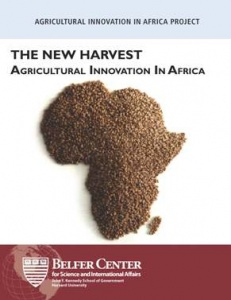
The New Harvest: Agricultural Innovation in Africa, by Calestous Juma (photo credit: Harvard's Belfer Center).
Madeleine Bunting discusses in the Guardian's Poverty Matters Blog today (3 December 2010) a new report by Harvard academic Calestous Juma, The New Harvest: Agricultural Innovation in Africa.
Bunting says: 'Rising food prices and terrible future scenarios of the impact of climate change on food production, are focusing minds on what is perceived as Africa's huge untapped potential for agriculture. This week yet another report from the International Food Policy Research Institute warns that climate change could push prices up by 130%, and calls for unprecedented human ingenuity to meet the challenge of feeding a burgeoning population. . . . Central to all the discussion is the assertion that Africa could produce far more food than it currently does. . . . On one side there is a powerful lobby which argues that biotechnology, massive investment in irrigation and mechanisation are the way forward, and on the other side are those who argue that these kinds of investments are usually tied up in big corporate deals in which local smallholder subsistence farmers lose out. . . . Juma and his prestigious panel of international experts have attempted to pick a politically feasible path between these two positions. . . . [W]hat will delight these very critics is Juma's championing of the smallholder farmer–not as an encumbrance to development but as central to its achievement. . . . China offers a fascinating model for Africa that is radically different from the western model of high-investment, export-orientated agriculture–the carnations from Kenya model. The key to China's success, argues Juma, is "a strong, competent, developmental state". . . .'
SciDev.Net reports today that experts in African food security gave Juma's report a cautious welcome.
'Bruce Campbell, head of the Consultative Group on International Agricultural Research's (CGIAR) programme on climate change, agriculture and food security, said: "While Juma's book is optimistic, one needs to recognise that there are tremendous challenges that are not very simple to solve". . . .
'And Philip Thornton, a senior scientist at International Livestock Research Institute in Kenya, who led a recent study that concluded global warming could spell a catastrophe for Africa's agriculture, warned that "there are many [climate change] factors that are not under Africa's control".
'These will work in the opposite direction to improvements in yields and new crop varieties, he said. "I was a little surprised when reading the press release about the report as it doesn't make much mention of climate change."'
Lindiwe Majele Sibanda, CEO of the Food, Agriculture and Natural Resources Policy Analysis Network, based in South Africa, and a member of ILRI's board of trustees, is a contributing author and member of the report's international advisory panel.
Read the whole articles at the Guardian's Poverty Matters Blog: How can Africa grow more food?, 3 December 2010 and at SciDev,Net: Africa could feed itself, says development expert, 2 December 2010.


